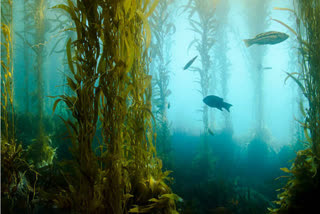A similar process happens in kelp. Predicted ocean warming and acidification can change microbes on the kelp surface, leading to disease and potentially putting fisheries at risk, they said.
Climate change is affecting biodiversityata global scale. In the marine realm, ocean warming and acidification are pushing dominant habitat-forming species, such as corals and large seaweeds, into decline, affecting biodiversity.
The study, published in the journal Proceedings of The Royal Society B, shows these two processes can cause changes in the microbiome on the surface of large brown seaweed leading to disease-like symptoms.
- Blistering, bleaching and eventually degradation of the kelp's surface is impacting the species' ability to photosynthesise and potentially survive. This could impact kelp forests around the world, researchers said.
- For example, it could contribute to further declines of the 8,000 kilometre long kelp forests that dominate the bottom half of Australia -- known as the Great Southern Reef -- potentially affecting all the associated ecosystems, including many species of fish, shellfish, lobster and abalone.
"If we lose the kelp forests, we also lose our two biggest fisheries," said Ziggy Marzinelli,lecturerat the University of Sydney.
